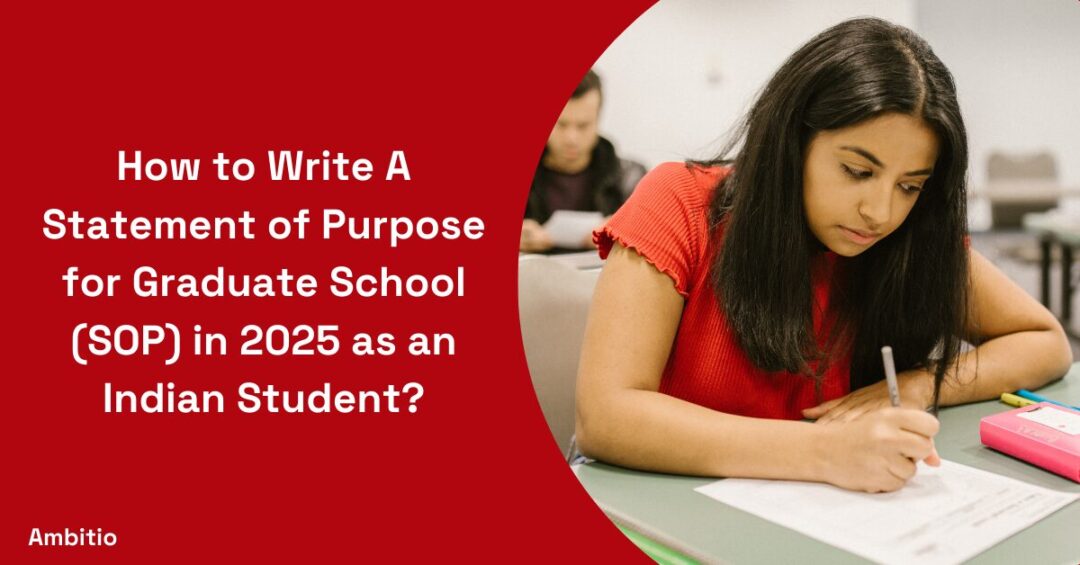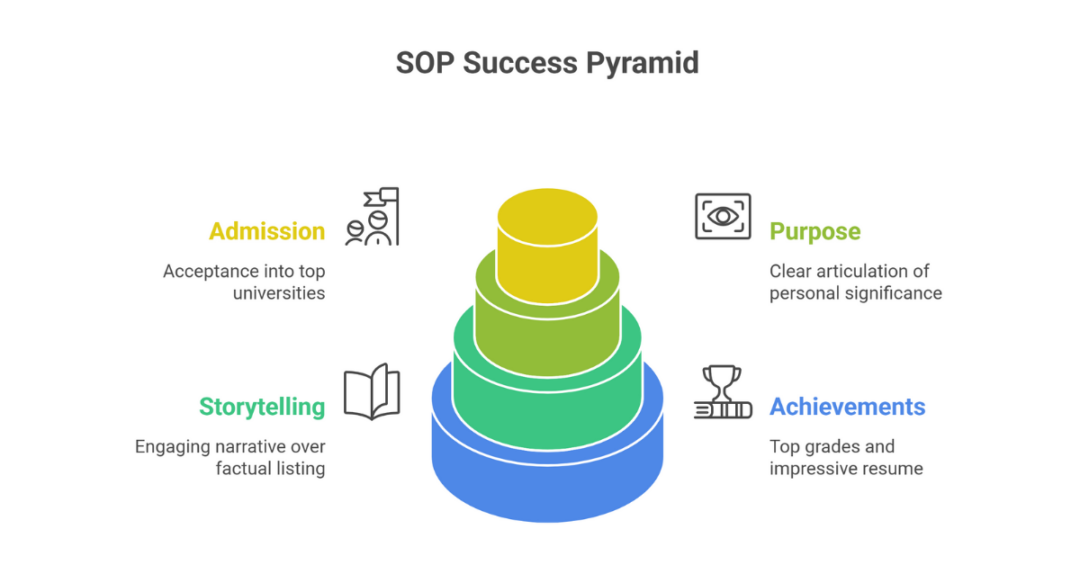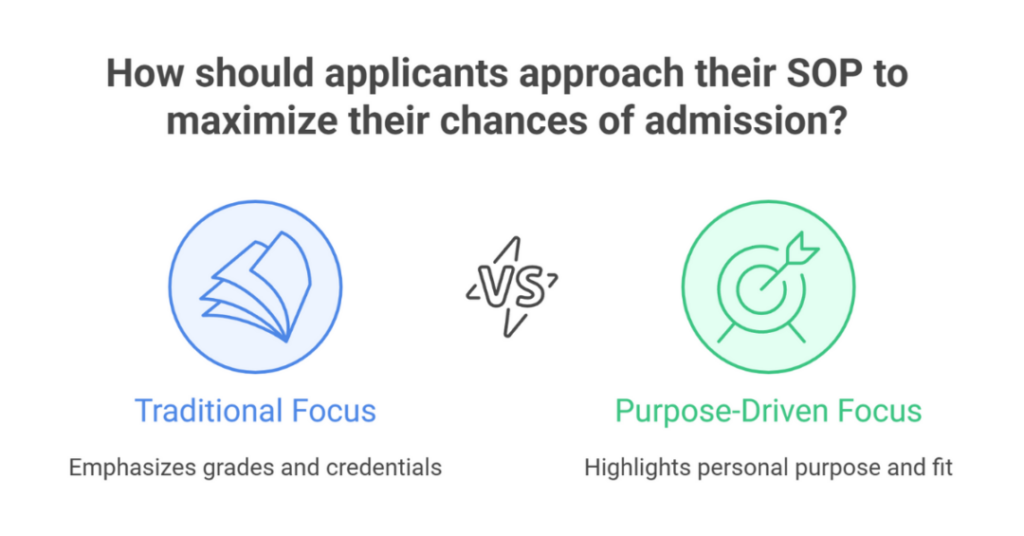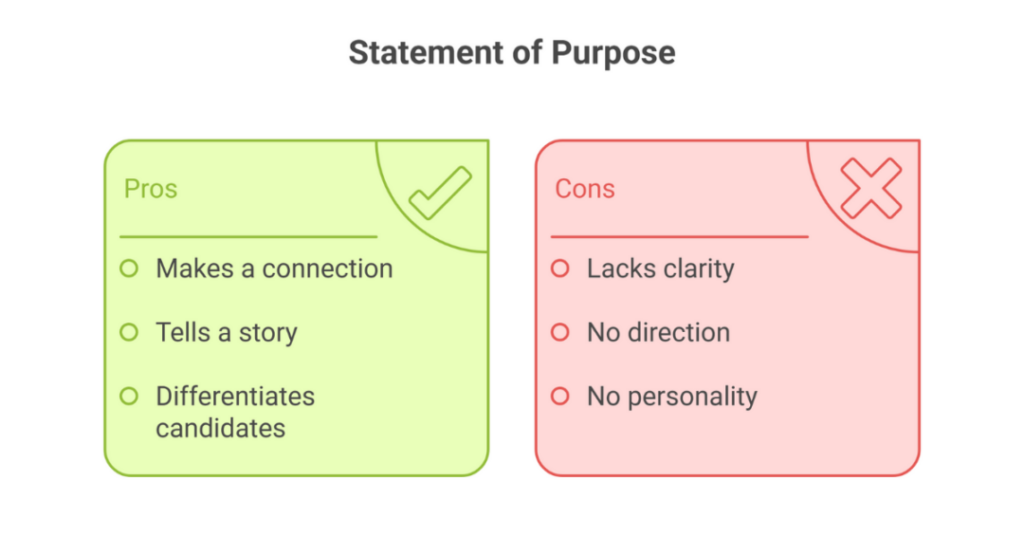1 September 2025
6 minutes read
How to Write the Best Statement of Purpose for Graduate School (SOP) in 2025 as an Indian Student?

Key Takeaways
- Statement of purpose decides your admission because grades alone don’t prove you are the right fit.
- A compelling SOP tells your story with clarity, connecting your experiences, goals, and the program.
- A weak SOP gets rejected instantly so structure it well, stay within the word limit, and avoid clichés.
You could have top grades, insane achievements, and a resume that screams “perfect candidate”, but if your statement of purpose falls flat, guess what?
Denied. Not because you weren’t good enough, but because the admission committee never felt why you’re the right fit. Most applicants treat their SOP like a boring LinkedIn bio, listing facts instead of telling a story. Big mistake. An SOP isn’t about what you’ve done; it’s about why it matters.
And if you don’t know how to make that clear? I will help you… because I have helped thousands of applicants who are already studying in top universities across the world. So, you can count on me.
What is a Successful Statement Of Purpose for Graduate School all About?
Your SOP is your first conversation with the admission committee—without ever being in the room. It’s your one shot to prove that you’re more than grades and credentials. Universities don’t just want students who can study—they want individuals who have a clear purpose for choosing a particular program.

That’s exactly why it’s called a Statement of Purpose—because without a purpose, your application is just a collection of documents.
- Every graduate program asks for an SOP because they need to understand who you are beyond numbers—your academic background, professional interests, career path, and the why behind it all.
- Writing your statement of purpose is non-negotiable in the application process. It tells the admission committee whether you’re a good fit, not just academically and professionally, but as a person.
- Most candidates assume their GPA or resume will do the talking. They’re wrong. A strong statement of purpose is what convinces decision-makers that you belong in their program.
- Universities use SOPs to separate qualified candidates from the right applicants. Your past experiences and qualifications may check all the boxes, but if you can’t articulate why you want to study this particular program, someone else who can will get the spot.
- Writing your statement properly means striking a balance—too formal, and you sound like a robot. Too casual, and you seem unprofessional. Nail the right tone, and you’re ahead of 90% of prospective students.
Why Universities Require A Statement Of Purpose for Grad School?
Because a degree isn’t just a course—it’s an investment. Universities aren’t just handing out seats; they’re selecting individuals who will make an impact in their field. Your transcripts, test scores like IELTS, TOEFL, GRE, GMAT, SAT and ACT, letter of recommendation and resume only show what you’ve done. But the real question is: why does it matter?

That’s where your Statement of Purpose (SOP) comes in. Universities need to filter thousands of applications, and grades alone don’t tell the full story. Your SOP is your personality on paper—it reveals your motivations, ambitions, and professional goals.
They’re not just looking for the most qualified applicants—they’re looking for the right fit. Writing your SOP helps them determine if your career path aligns with what their graduate program offers.
Common mistakes — like being vague, using generic statements, or failing to connect your credentials to the particular program—are instant red flags. Universities need clarity, not clichés.
What Is The Key Difference Between Personal Statement And Statement Of Purpose for International Education?
There is one other word that may confuse you: Personal Statement. While it sounds similar to a Statement of Purpose, the two serve very different forms in an application process.
It is important, especially if you are planning on studying abroad, to understand the differences because universities will expect you as a prospective student to follow clear criteria when writing your SOP or a personal statement.
Here is a straightforward breakdown of the differences:
| Aspect | Statement of Purpose | Personal Statement |
|---|---|---|
| Focus | Emphasis on academic and professional goals and explains why you would like to study a specific course. | Emphasis on personal experiences, challenging life experiences and unique qualities, which have shaped one’s journey. |
| Content | Does the main think about qualifications, career development and explaining how the program will further your own aspirations. | Shares life stories,Has stories of life, not a qualifications-list, motivations, of writing the statement, matters that have shaped you in real defining moments. |
| Tone | Formal and professional, structured like an essay with logical progression. | More personal, reflective, narrative/non-linear that is often emotional. |
| Usage | Required for most graduate school applications and research-based programs. | Common for undergraduate applications, scholarships, and some creative fields. |
| Word Limit | Typically has a strict word count (500-1000 words) depending on the university. | Can vary but usually offers more flexibility in length. |
| Objective | Convince the admission committee that you are the right academic fit for the program. | Show the committee who you are as a person beyond your academic background. |
How To Write A Statement Of Purpose (SOP) from Statement of Purpose Examples?
Most SOPs fail before they even begin. Not because the candidate isn’t qualified, but because their personal essay reads like a lifeless summary. A statement of purpose for grad school isn’t a formality—it’s the most important part of your application.
This is where the graduate division assesses whether you have the clarity, ambition, and writing skills to succeed. A weak SOP means rejection, no matter how strong your grades are.
But a well-written SOP? That’s what turns a candidate into an admit. Let’s break it down—step by step.
1. Create an Outline Before You Start
Before you begin writing the statement of purpose, take the time to create an action plan or outline. This will help you organize your thoughts and assist in writing an SOP that has an organized flow.
Think about the main areas to write on: academic experience, work experience, and future plans. Identify experiences you have gained knowledge from- research projects, internships, and service (volunteer) projects. Keep the university’s vision in mind while writing and include aspects that link your experience to that particular university.
2. Start Strong With a Compelling Introduction
The opening of your SOP is where you grab attention. Skip the clichés. Instead, tell a short, engaging story that reflects your passion for your field of study and why you’re pursuing graduate education. This sets the foundation for a compelling narrative that admissions committees remember.
3. Connect Your Academic and Professional Interests
Your SOP should bridge your academic statement with your professional and personal experiences. Explain how your past education, work and education journey, and experiences have prepared you for the graduate study you’re applying for. Show them why you’re not just qualified—but why you’re the right fit.
4. Follow the Right Structure and Word Limit
Many candidates struggle with organization. Keep your statement structured and mind the word count of statement of purpose. The format may vary, but most SOPs follow this structure:
- Introduction and conclusion – A strong start and a powerful last paragraph.
- Academic background – What you’ve learned and how it shaped your interests.
- Professional experience – How your work experience prepared you for grad school.
- Future goals – How this graduate program aligns with your career path.
5. Use Writing Tips from Statement of Purpose Examples
Even the most accomplished writers need some kind of inspiration or other resources. By looking at statement of purpose examples, you can learn how winning candidates organize their statement of purpose.

To make sure your statement of purpose is engaging and effective, be sure to write clearly, concisely, and persuasively. And these writing tips will help ensure your draft is on the right track: Avoid passive voice, make sure your sentences to stay brief, and focus on specific examples.
6. Edit, Proofread, and Get Feedback
Never submit a first draft. Edit your work thoroughly, make sure it is clear, and get feedback. Ask your mentors, professors, or professionals to review your statement of purpose. Organizations like IDP India can offer help too. Strong writing skills, with a fine-tuned statement of purpose, your chances of admission will improve greatly.
Conclusion
At the end of the day, your statement of purpose for graduate school isn’t just another requirement—it’s the one thing that can make or break your school admission. You could have the best credentials, but if you’ve written an SOP that lacks clarity, direction, or personality, it won’t matter.
Think of it this way—e.g., if two candidates have the same credentials, the one who tells a better story wins. A successful statement of purpose isn’t about sounding impressive; it’s about making a real connection with the admissions committee.
Most applicants struggle to write a good SOP and often ends up sounding arrogant—but you won’t. At Ambitio, our AI-powered study abroad experts help you craft a powerful, standout statement of purpose that gets noticed. No fluff, no clichés—just a compelling story that proves you belong. So, book a free consultation today and get your statements of purpose sorted.
FAQs
What is a Statement of Purpose (SOP)?
An SOP is a concise essay required by universities that outlines your academic background, career goals, motivations, and why you are a good fit for the program
How long should an SOP be?
Typically, an SOP should be 500–1,000 words or 1–2 pages, depending on the university’s guidelines
What should be included in an SOP?
Key components include an introduction, academic background, professional experiences, career goals, reasons for choosing the program/university, and a conclusion
How is an SOP different from a personal statement?
An SOP focuses on academic and professional goals, while a personal statement highlights personal attributes and experiences
Can I use the same SOP for multiple universities?
While the core content can be similar, it’s essential to tailor each SOP to the specific program and university to demonstrate genuine interest
What tone should I use when writing an SOP?
Write in an active voice with a professional yet personal tone that reflects your passion and optimism
How do I make my SOP stand out?
Start with an engaging introduction, provide specific examples of achievements, and clearly align your goals with the program’s offerings

You can study at top universities worldwide!
Get expert tips and tricks to get into top universities with a free expert session.
Book Your Free 30-Minute Session Now! Book a call now




























